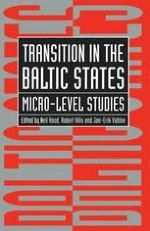1997 | OriginalPaper | Chapter
Micro-Economic Differences between or within Baltic Nationalities?
Author : Richard Rose
Published in: Transition in the Baltic States
Publisher: Palgrave Macmillan UK
Included in: Professional Book Archive
Activate our intelligent search to find suitable subject content or patents.
Select sections of text to find matching patents with Artificial Intelligence. powered by
Select sections of text to find additional relevant content using AI-assisted search. powered by
The distinction between macro- and micro-economics is familiar: macroeconomics normally refers to properties of countries reported in aggregated national income accounts and central bank statistics, whereas micro-economics refers to individuals and household-level data. Although economists tend to specialise at one or another level of analysis, the economy as the whole can only be understood by bringing the two halves together. Not to do so risks committing gross errors. But just as total national income cannot be inferred from a statistic about the number in poverty, so household living standards cannot be inferred from data about the money supply. It is a basic ecological fallacy (cf. Robinson, 1950) to infer characteristics of individuals from characteristics of aggregates. Within a country we should not generalise about the distribution of poverty between regions or households from the mean figure for gross domestic product per capita. In a complementary fashion, it is an ‘individualist’ fallacy to infer properties of regions, impersonal organisations such as corporations, or such macro-economics measures as the balance of payments, from data about individuals (Scheuch, 1966).
